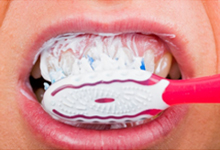Tooth sensitivity is one of the most common causes of toothache. Many people suffer from it and it can start at any time. It is more common in people aged between 20 and 40, although it can affect people in their early teens and when they are over 70. Sensitivity occurs when the tooth enamel becomes damaged exposing the sensitive dentin below, or where gums recede exposing the tooth roots. The exposed areas respond to hot and cold and trigger pain.
Preventing tooth sensitivity
There are a number of steps you can take to help prevent sensitive teeth including:

- Use a soft bristle toothbrush and work at a 45-degree angle to your gum to keep enamel clean and strong as this will reduce the risk of toothbrush abrasion and gum recession.
- Change your toothbrush every three months or sooner if the bristles become worn to ensure that you are brushing effectively.
- Use a sensitive toothpaste, which can help to desensitise teeth. It is important to remember that the relief will only continue while you are using the sensitive toothpaste.
- Brush your teeth twice a day for two minutes using a fluoride toothpaste and use interdental cleaning aids daily. This helps to ensure your teeth and gums remain healthy, reducing the risk of gum recession.
- Reduce the damage caused by acidic foods and drinks by limiting them to mealtimes. Acidic drinks should be drunk through a straw to limit the time they have in contact with your teeth.
- Wait at least 30 minutes after eating or drinking as this allows your teeth to reharden and will reduce the risk of you brushing away the enamel.
- Do you notice yourself clenching or grinding your teeth at times of stress? The dentist may be able to provide you with a mouth guard to prevent any further damage to your teeth.
- Teeth whitening can cause some sensitivity but this should improve as soon as you finish treatment. Your dentist will also be able to advise you on ways to limit sensitivity while you continue treatment.
- Visit your dentist as often as they recommend so that any problems can be identified early and treated quickly.

If you continue to notice problems it is important that you attend for an appointment with your dentist so that they can get to the root cause of the problem. They may be able to recommend alternative treatments to give you long lasting relief.
If you would like to book an appointment do not hesitate to contact Ringmer Dental on 01273 813898.


